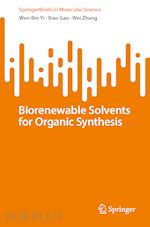
Questo prodotto usufruisce delle SPEDIZIONI GRATIS
selezionando l'opzione Corriere Veloce in fase di ordine.
Pagabile anche con Carta della cultura giovani e del merito, 18App Bonus Cultura e Carta del Docente
In this brief the authors introduce a series of recently developed bio-based solvents including cyclopentyl methyl ether (CPME), ?-valerolactone (GVL), 2-methyl tetrahydrofuran (2-MeTHF), propylene carbonate (PC), and cyrene. Traditional organic solvents used for organic synthesis (such as benzene, ether, chloroform) have a series drawbacks on toxicity, environmental impact, and safely related issues. In addition, the fossil fuel-derived organic solvents are not sustainable. Therefore the development of biorenewable solvents is a topic of current interest. For each of the solvents, their production, toxicity profile, renewable pathway, and their utility in organic synthesis, biosynthesis, and separation processes is discussed. The target audiences of this book are organic and medicinal chemists with interests in using green solvents. It can also be used as a reference for undergraduate and graduate courses related to organic and green chemistry.
Introduction of biorenewable solvents.- Biorenewable solvents.- Cyclopentyl methyl ether (CPME).- ?-alerolactone (GVL).- 2-Methyl tetrahydrofuran (2-MeTHF).- Glycerine carbonate (GC).- Propylene Carbonate (PC).- Cyrene.- Other solvent.-Conclusive Remarks.
Dr. Wei Zhang is a Professor and the Director of the Center for Green Chemistry at the University of Massachusetts Boston. He received his PhD and did his post-doctoral research at the University of Pittsburgh. His previous positions include Research Assistant Professor at the University of Pittsburgh, Senior Chemist at DuPont, and Director at Fluorous Technologies, Inc. Prof. Zhang's research is in the areas of fluorous chemistry, organocatalysis, medicinal chemistry, and green chemistry. He has coauthored over 250 papers including three in Chem. Rev., co-edited “Green techniques for organic and medicinal applications” (Wiley 2012 & 2018), and a SpringerBrief “Pot, Atom, and Step Economy (PASE) Synthesis” (2019). He is editor and editorial advisory member of nine international journals.
Dr. Wenbin Yi studied chemistry at Nanjing University of Science & Technology (NJUST) and received B.Sc. (2002) and Ph.D. (2006) under the supervision of Professor Dr Chun Cai. He is currently a Professor in Department of Pharmaceutical and Fine Chemicals at NJUST. His research interests focus on fluorine chemistry with an emphasis on green synthetic methods. He has published over 100 scientific papers in the journals such as Angew. Chem. Int. Ed., J. Am. Chem.Soc, Nat. Commun., CCS Chemistry, and Green Chem.
Dr. Xiao Gao studied material chemistry at Doshisha University and received B.Sc. After that, he finished his Master course at Osaka University. At 2020, he finished his Ph.D. at Kyoto University under the supervision of Professor Dr Yoshiharu Uchimoto. He is currently an assistant professor in the Department of Pharmaceutical and Fine Chemicals at NJUST. His research interests focus on green chemistry, renewable energy, polymer electrolyte, electrochemical interface. He has published over 10 scientific papers in journals such as Langmuir, ACS omega, and ACS Appl. Eng. Mat.











Il sito utilizza cookie ed altri strumenti di tracciamento che raccolgono informazioni dal dispositivo dell’utente. Oltre ai cookie tecnici ed analitici aggregati, strettamente necessari per il funzionamento di questo sito web, previo consenso dell’utente possono essere installati cookie di profilazione e marketing e cookie dei social media. Cliccando su “Accetto tutti i cookie” saranno attivate tutte le categorie di cookie. Per accettare solo deterninate categorie di cookie, cliccare invece su “Impostazioni cookie”. Chiudendo il banner o continuando a navigare saranno installati solo cookie tecnici. Per maggiori dettagli, consultare la Cookie Policy.